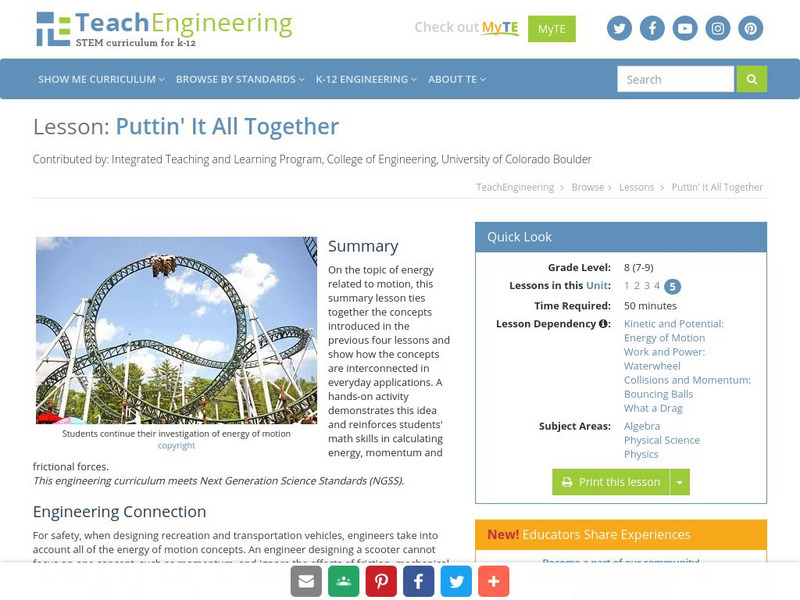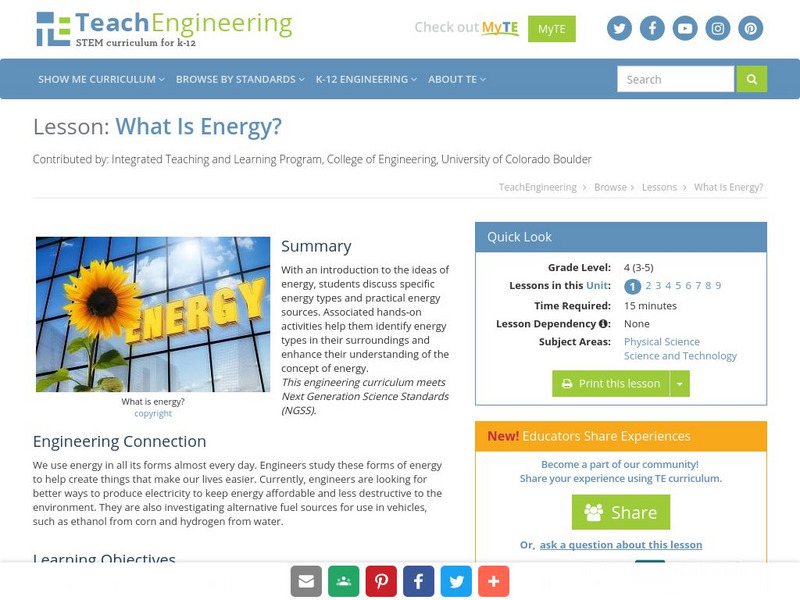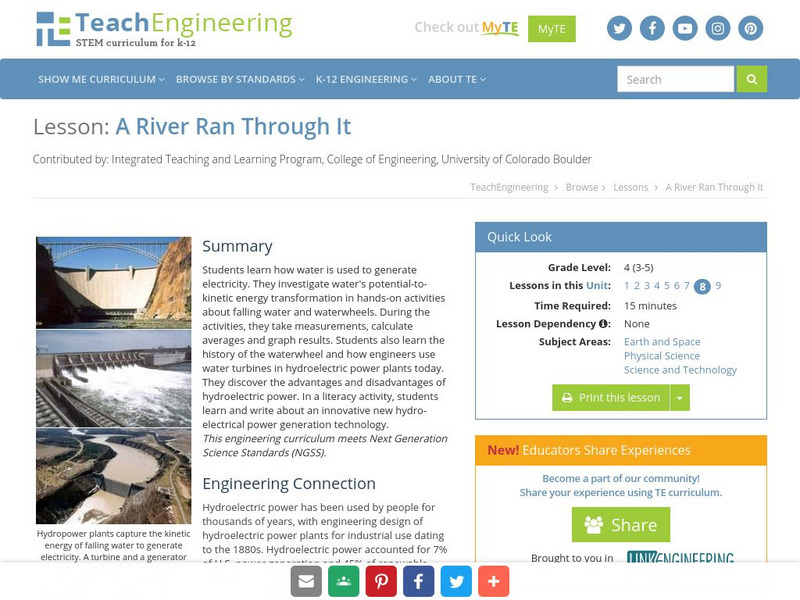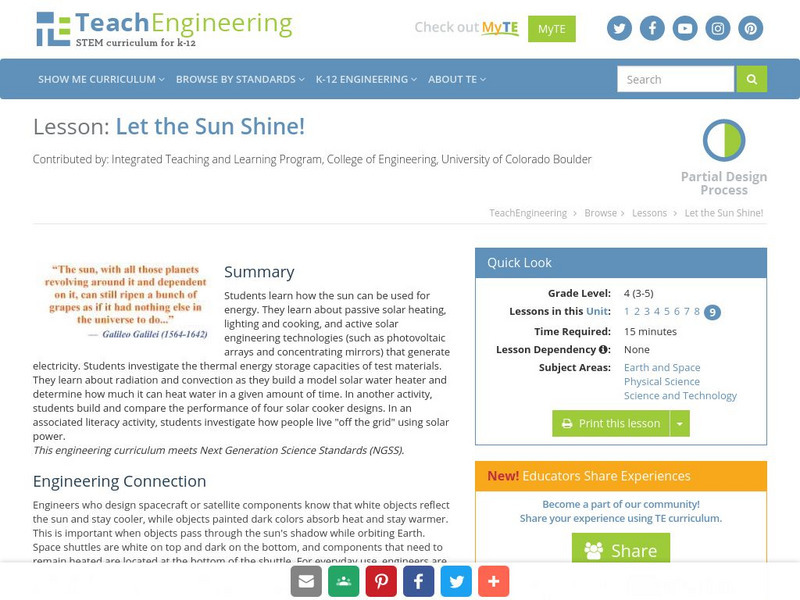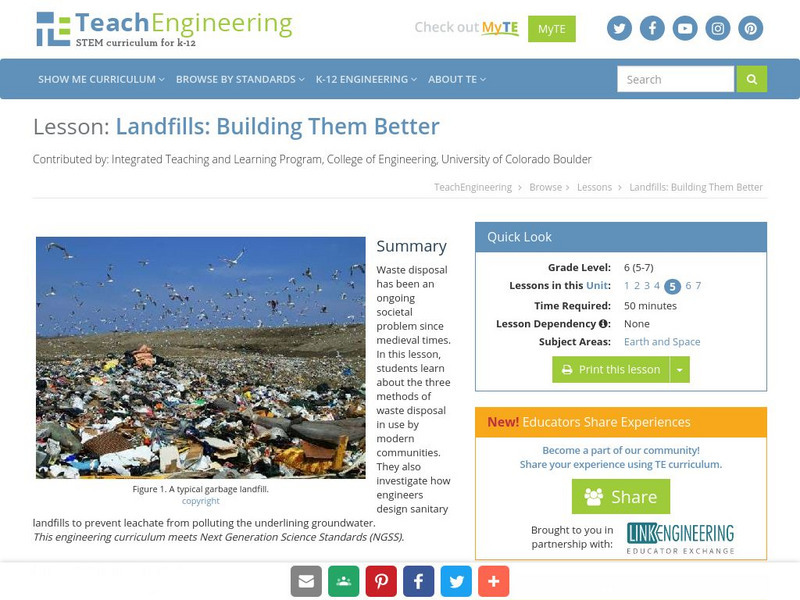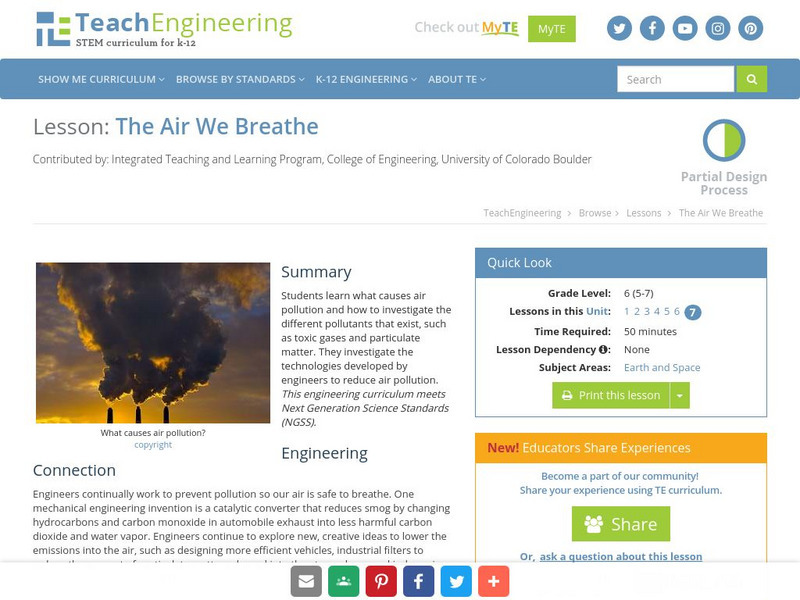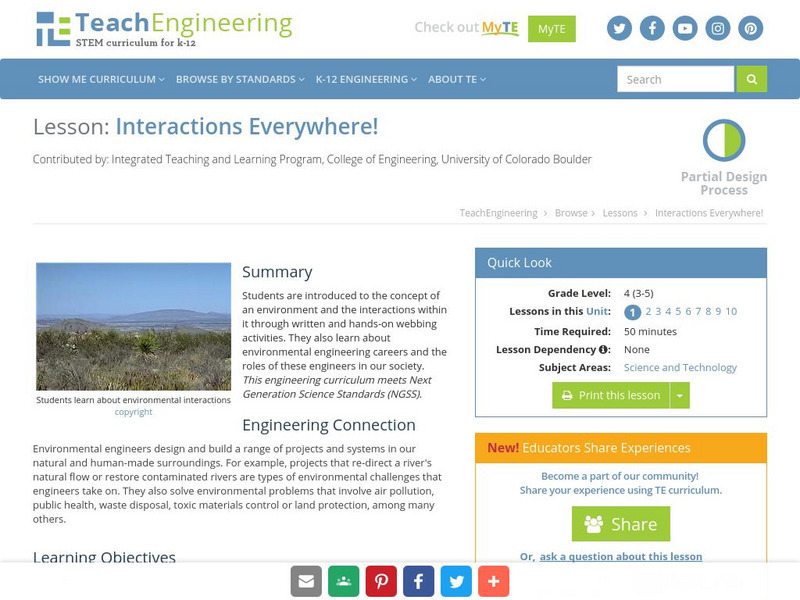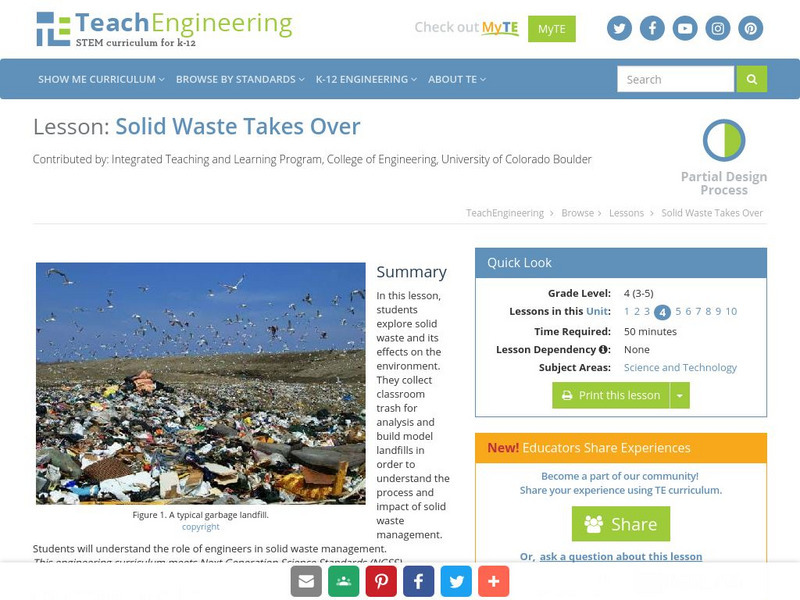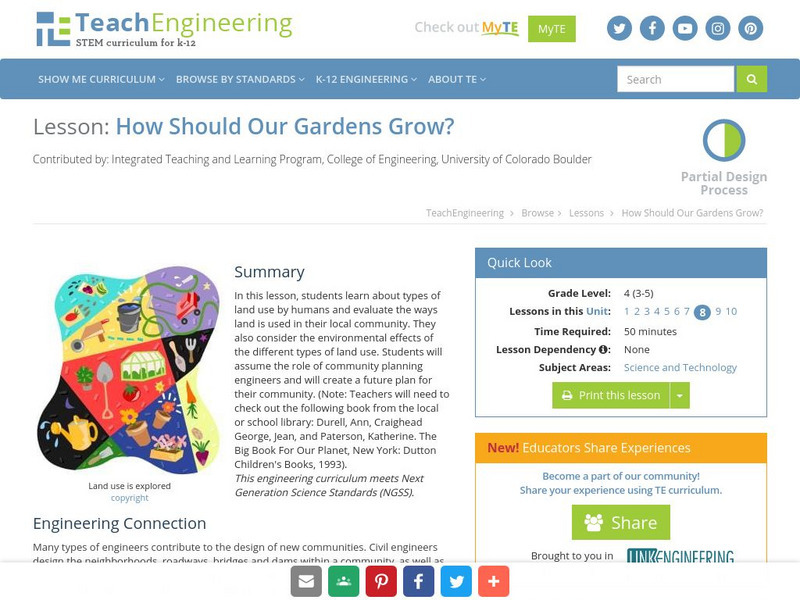TeachEngineering
Teach Engineering: Work and Power: Waterwheel
Investigating a waterwheel illustrates to students the physical properties of energy. They learn that the concept of work, force acting over a distance, differs from power, which is defined as force acting over a distance over some...
TeachEngineering
Teach Engineering: What a Drag
Students learn about friction and drag - two different forces that convert energy of motion to heat. Both forces can act on a moving object and decrease its velocity. Students learn examples of friction and drag, and suggest ways to...
TeachEngineering
Teach Engineering: Puttin' It All Together
On the topic of energy related to motion, this summary lesson is intended to tie together the concepts of work, power, collisions, momentum and drag. A hands-on activity demonstrates this idea and reinforces students' math skills in...
TeachEngineering
Teach Engineering: What Is Energy?
With an introduction to the ideas of energy, students discuss specific types of energy and the practical sources of energy. Hands-on activities help them identify types of energy in their surroundings and enhance their understanding of...
TeachEngineering
Teach Engineering: Energy Conservation
Students are introduced to the idea that energy use impacts the environment and our wallets. They discuss different types of renewable and nonrenewable energy sources, as well as the impacts of energy consumption. Through a series of...
TeachEngineering
Teach Engineering: The Energy of Music
Students are introduced to sound energy concepts and how engineers use sound energy. Through hands-on activities and demonstrations, students examine how we know sound exists by listening to and seeing sound waves. They learn to describe...
TeachEngineering
Teach Engineering: How Hot Is It?
Students learn about the nature of thermal energy, temperature and how materials store thermal energy. They discuss the difference between conduction, convection and radiation of thermal energy, and complete activities in which they...
TeachEngineering
Teach Engineering: A River Ran Through It
Students learn how water is used to generate electricity. They investigate water's potential-to-kinetic energy transformation in hands-on activities about falling water and waterwheels. During the activities, they take measurements,...
TeachEngineering
Teach Engineering: Let the Sun Shine!
Students learn how the sun can be used for energy. They learn about passive solar heating, lighting and cooking, and active solar engineering technologies (such as photovoltaic arrays and concentrating mirrors) that generate electricity....
TeachEngineering
Teach Engineering: Oil Spill
This activity will allow students to explore an important role of environmental engineers: cleaning the environment. Students will learn details about the Exxon Valdez oil spill, which was one of the most publicized and studied...
TeachEngineering
Teach Engineering: How Clean Is That Water?
This lesson plan helps students understand the factors that affect water quality and the conditions that allow for different animals and plants to survive. Students will look at the effects of water quality on various water-related...
TeachEngineering
Teach Engineering: An Underground River
Groundwater is one of the largest sources of drinking water, so environmental engineers need to understand groundwater flow in order to tap into this important resource. Environmental engineers also study groundwater to predict where...
TeachEngineering
Teach Engineering: Who's Down the Well?
Drinking water comes from many different sources, including surface water and groundwater. Environmental engineers analyze the physical properties of groundwater to predict how and where surface contaminants will travel. In this lesson,...
TeachEngineering
Teach Engineering: Landfills: Building Them Better
Waste disposal has been an ongoing problem since medieval times. Environmental engineers are employed to develop technologies to dispose of the enormous amount of trash produced in the United States. In this activity, young scholars will...
TeachEngineering
Teach Engineering: You Are What You Drink!
Contamination in drinking water sources or watersheds can negatively affect the organisms that come in contact with it. The affects can be severe - causing illness or, in some cases, even death. It is important for people to understand...
TeachEngineering
Teach Engineering: The Air We Breathe
During this lesson, students will learn what causes air pollution and how to investigate the different pollutants that exist, such as toxic gases and particulate matter. Students will investigate the technologies developed by engineers...
TeachEngineering
Teach Engineering: Interactions Everywhere!
This lesson introduces students to the concept of an environment and the interactions within it through written and hands-on webbing activities. The lesson also introduces students to environmental engineering careers and their roles in...
TeachEngineering
Teach Engineering: I've Got Issues!
This lesson will introduce students to environmental issues. Students will recognize environmental opinions and perspective, which will help them define themselves and others as either preservationists or conservationists. Students also...
TeachEngineering
Teach Engineering: Naturally Speaking
In this lesson plan, students will identify the Earth's natural resources and classify them as renewable or non-renewable. They will simulate the distribution of resources and discuss the fairness and effectiveness of the distribution....
TeachEngineering
Teach Engineering: Solid Waste Takes Over
In this lesson, students explore solid waste and its effects on the environment. They will collect classroom trash for analysis and build model landfills in order to understand the process and impact of solid waste management. Students...
TeachEngineering
Teach Engineering: 3 Rc (Reduce, Reuse, Recycle and Compost)
In this lesson plan, students expand their understanding of solid waste management to include the idea of 3RC (reduce, reuse, recycle and compost). They will look at the effects of packaging decisions (reducing) and learn about...
TeachEngineering
Teach Engineering: Splish, Splash, I Was Takin' a Bath!
In this instructional activity, learners will explore the causes of water pollution and its effects on the environment through the use of models and scientific investigation. In the accompanying activities, they will investigate...
TeachEngineering
Teach Engineering: Got Dirty Air?
This lesson introduces students to the concepts of air pollution and technologies that have been developed by engineers to reduce air pollution. Students develop an understanding of visible air pollutants with an incomplete combustion...
TeachEngineering
Teach Engineering: How Should Our Gardens Grow?
In this lesson plan, students will learn about types of land use by humans and evaluate the ways land is used in their local community. They will also consider the environmental effects of the different types of land use. Students will...




